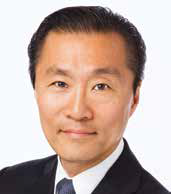
Don Liu
EXECUTIVE VICE PRESIDENT AND CHIEF LEGAL AND RISK OFFICER
TARGET CORPORATION
MINNEAPOLIS, MINNESOTA, USA
When Don Liu joined Target’s 500-person legal affairs department in 2016, he set out to accomplish three goals: (1) support Target’s executive team and board of directors in achieving its business goals; (2) become less risk-averse as a unit; and (3) increase the diversity and inclusion efforts of the department.
Liu likes to say he is a businessman first and a lawyer second, to the chagrin of some of his lawyers. “You can have tremendous sway in the final decision-making as an in-house counsel because you’re at the business table making those decisions with your client. I like being the decision-maker,” he emphasizes.
He joined Target from Xerox Corp., where he led the technology company’s legal department for several years. His transition from a company like Xerox, which mostly sold products and services to other businesses, to a consumer-facing company that has 1,844 stores and 350,000 employees included a “fairly steep learning curve,” according to Liu. While he had to brush up on some consumer legal issues, the greatest learning occurred in the business realm.
The B2C business
For the past several years, Target and other customer-facing businesses have had to make decisions that extend beyond everyday operations. In 2014 (before Liu joined the company), for example, Target signed an amicus brief to support marriage equality. Target had to weigh its commitment to LGBT team members and guests in an increasingly partisan world, keeping in mind the millions of people who also decide every day whether they want to shop at Target or another retailer. Fortunately, the company has a group of team members that manage the company’s reputation, including what positions the company should take on policy issues. Liu’s team generally manages the decision-making process, but the ultimate decision is always a cross-functional group decision.
Target’s stock has been increasing as the company caters to more health-conscious buyers with its Good & Gather brand, a food and beverage line that does not contain artificial flavors or synthetic colors. Liu oversees the compliance function that includes team members who are responsible for food safety and food labeling.
The company also rolled out a loyalty program, Target Circle, that should lead to increased sales. Liu believes that the legal affairs department has been successful helping the business achieve its goals so far, but challenges remain on the horizon for his team.
New privacy laws need to be addressed not only from a compliance perspective but also in a broader prospective, progressive way that can anticipate how data privacy laws and consumer behavior may evolve. Liu believes that consumers will want to have a choice when it comes to their data. One customer may be okay sharing more data than another person. Target needs to have the ability to cater to the level of trust the customer possesses. “As a retailer, we want to bring convenience with minimum intrusion,” he explains. “That’s the name of the game.” It’s an area where his team could be less risk-averse, one of his goals for his department.
The second area that Liu identified as a potential challenge is the company’s large workforce. Target is the eighth largest employer in the United States. Staying ahead of employment and labor laws is a never-ending task.
He is also an adamant supporter of diversity and inclusion efforts. His goal is to build a diverse team that values all perspectives and experiences and to push the legal industry to become more embracing of diversity and inclusion. It’s the most long term of his goals and one that is rooted in his upbringing. To increase diversity and inclusion in the legal department, Liu has joined the Inclusion Initiative and became more involved in organizations like NAMWOLF. He encourages reverse mentoring, where a senior team member is mentored by a more junior team member on diversity and inclusion and other managerial issues.
In West Philadelphia…
Liu came to the United States from South Korea when he was 10 years old. Along with his father and mother, a small business owner and nurse, and his two younger siblings, he settled in West Philadelphia. Those first years in the United States were difficult — he was the first in his family to learn English — but they also laid the foundation for a lifelong dedication to diversity.
Liu thought African Americans comprised most of the United States because that’s who his friends were during his first year. “My sister and I were the only non-black students at our elementary school,” he recalls. After a year in West Philly, Liu’s family decamped to the suburbs, where they were one of the first Asian families to move into a very white neighborhood. Moving is difficult for any child, but the combination of learning a new language, the mysterious demographic changes, and a confusing set of social rules made for what Liu calls a “culturally traumatic experience and process.”
The memories of those years drove his desire to become a preacher — the first Asian American Martin Luther King Jr., in his words. “I wanted to improve the life of Asian Americans here in the United States as Martin Luther King Jr. fought for the livelihood and freedom of African Americans. I saw that my parents were struggling to live in the United States and to understand the unwritten rules that weren’t always clear to them,” he says. As he progressed through college, his roommates tried to persuade him to shift his focus from preaching to helping the world in more practical ways — like becoming a civil rights lawyer. They succeeded, but Liu still earned his BA in philosophy and religion from Haverford College before heading to Columbia University School of Law to pursue his new dream of becoming a lawyer.
At Columbia, one of Liu’s professors was Jack Greenberg, the former head of the NAACP. Liu learned a lot about what being a civil rights lawyer entailed from Greenberg. “The concept of being a corporate lawyer at a large company was just not within the closest proximity, not even close to what my interests were,” he reflects. “I didn’t even know there was such a thing as an in-house lawyer.”
One of the realities he learned from Greenberg is that civil rights lawyers don’t make a lot of money. In order to pay off his loans, Liu joined Simpson Thatcher & Bartlett in New York City, where he put his head down and worked as much as he could to reduce his six-figure debt. After a few years at the firm, a headhunter called him, at the suggestion of a college classmate, to lure him back to his hometown of Philadelphia, where he started his in-house career.
Liu also had the privilege to serve as a law clerk, which few minorities have a chance to do. He learned to see and think like a judge or lawmaker.
Getting to know… Don Liu
ACC’S ANNUAL MEETING WILL TAKE PLACE IN PHILADELPHIA, YOUR HOMETOWN, NEXT YEAR. AND THE YEAR AFTER THAT, IT WILL BE IN MINNEAPOLIS. WHAT IS YOUR FAVORITE THING ABOUT YOUR HOMETOWN AND YOUR FAVORITE THING ABOUT YOUR LATEST HOME?
The Philadelphia Eagles! I am a lifelong fan who got to see them finally beat the Pats in the Super Bowl a couple of years ago right here in Minneapolis. I also love having a cheesesteak along with my two kids, watching the Eagles at the Linc.
We call the Minneapolis the Twin Cities because it’s actually two cities separated by 15 minutes. The first thing I will mention is the food. I wouldn’t call myself a foodie, but this midsize city has fantastic food.
Number two, it’s an unusual city in that it’s got really convenient entertainment all within the city limits starting with Target Field where baseball is played, Target Center where basketball is played, and the US Bank Stadium where the Vikings play football – all within 10 blocks of each other. I live right smack in the middle of those stadiums, and I’m able to enjoy the sports scene regularly.
Finally, it’s manageable. Nothing is more than 15 minutes from anywhere in the Twin Cities. People complain about the traffic, and I say, “This is not real traffic,” but they will still complain.
I KNOW YOU ARE BASICALLY TETHERED TO YOUR PHONE, BUT DO YOU HAVE A HOBBY YOU LIKE TO ENJOY OUTSIDE THE OFFICE?
I love going to karaoke to sing with my friends. I am a terrible singer, but who cares?!
DO YOU HAVE A BOOK, MOVIE, OR PODCAST RECOMMENDATION FOR OUR READERS?
I do. I don’t get to read often, but I’d say the last great book I’ve read is Pachinko by Min Jin Lee, a former big law attorney who had a life-changing experience and decided to become a novelist. Her second book became a finalist for the National Book Award. I’m good friends with her and a huge fan. I’m dying to see her third book come out.
Giving back
The most rewarding part of Liu’s career is the chance to mentor. To him, it feels like the reason he got into law in the first place: to help people. He guides his mentees through some of the biggest decisions in their lives. One question he always asks at the outset is: Are you sure this is what you want?
He stresses that he loves his job, but he also makes a lot of sacrifices. “I’m on 24/7. My phone never leaves me more than a foot when I’m asleep. The intrusion of business into my personal life is something I have accepted and live by. It’s actually an inability to get away from work,” he clarifies. The other aspect he cautions law students about is the level of risk they can handle. As a leader, tough decisions are part of the job. Someone who aspires to the top job has to live with the consequences of making a difficult decision. Those decisions often affect many people — whether it’s customers, vendors, shareholders, employees, or coworkers.
Liu encourages his mentees to join nonprofit boards. He knows everyone is busy and the time commitment can be intimidating, but the benefits outweigh the costs. It is the best way to learn about leadership, he contends. There are two factors that stand out: (1) being able to see what it’s like to be on a board and see how employees support the board; and (2) the chance to deal with problems that concern us as citizens, whether it’s diversity, crime, climate change, or other community issues.
The chance to use your skills to help the community at large is a reward in itself. Liu’s passion for diversity has led him to be involved in the Minority Corporate Counsel Association and the National Asian Pacific American Bar Association for over 20 years. He wouldn’t trade that experience for anything.
Liu’s life has taken a few turns — a few lucky turns, according to him — and he intends to pass that luck along. But as he tells his legal department, you can’t get lucky if you’re afraid of risk.




